
Applied Sensorimotor Research Laboratory – ENS 213
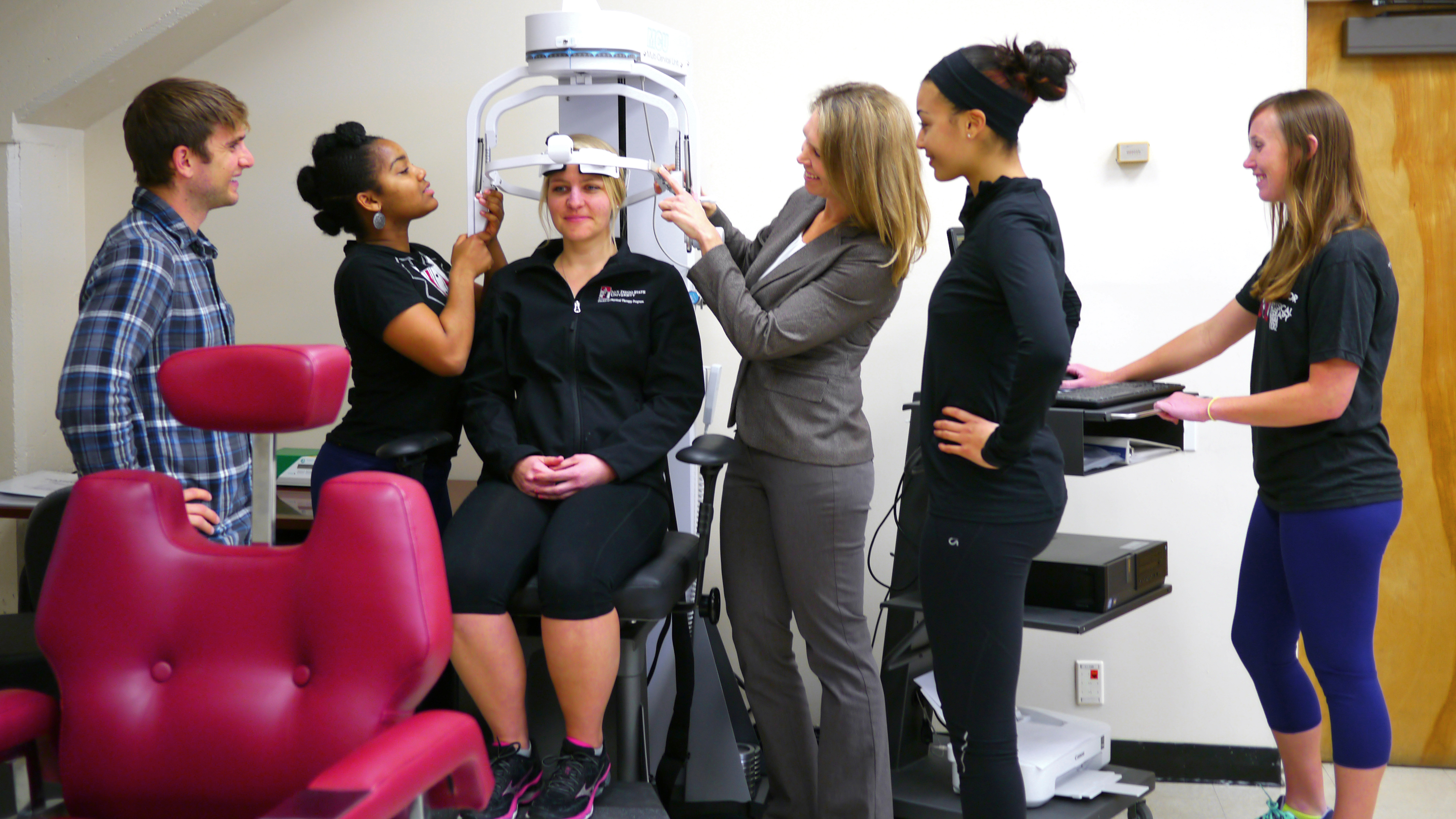
The goal of my research is to identify mechanisms underlying psychomotor responses to stress and pain, and to apply this knowledge to the prevention and treatment of chronic musculoskeletal pain disorders. We use a variety of neurophysiologic techniques to investigate how the central nervous system responds to stress and pain in healthy individuals and clinical populations. We also conduct clinical studies to investigate risk factors and novel treatment strategies for chronic pain, with a specific focus on spine pain and headache.
Primary experimental techniques include surface and intra-muscular electromyography (EMG), functional magnetic resonance imaging (fMRI), functional near infrared spectroscopy (fNIRS), and quantitative sensory testing (QST). Primary behavioral approaches include motor skill retraining, motivational interviewing, cognitive behavioral skills training, and pain neuroscience education. Integrated mind-body approaches in physical rehabilitation are a primary focus of the lab.

Facility
Applied Sensorimotor Research Laboratory (ASML). The ASML comprises 470 sq. ft. of dedicated research space in the Exercise and Nutritional Sciences Building (Room 213) at SDSU. The ASML houses portable research equipment used for brain imaging (fNIRS), quantitative sensory testing, electromyography, and clinical assessment of neuromuscular impairments and functional performance. Private clinical examination space and a conference area for research meetings are also available. Four shared computer workstations are used for data entry, processing, and analysis by students and research assistants.
Additionally, the ASML maintains active collaborations with other institutions and clinics in the local community, including:
Academic Partnerships
Center of Excellence for Stress and Mental Health (CESAMH), Veterans Administration San Diego Health System (VASDHS). The CESAMH mission is to improve the health and well-being of Veterans by combining research, education, and clinical care into a single program leveraging the expertise of clinical and academic affiliates to help reduce the time from scientific discovery to clinical implementation. CESAMH supports basic research into the neural mechanisms of trauma-related health problems to develop and test novel preventive and treatment strategies.
UCSD Center for Functional Magnetic Resonance Imaging (CFMRI). The Keck Center is approximately 7,000 square feet and houses two research-dedicated GE 3T Signa Infinity MRI scanners (GE MR750) with Excite System for human studies. The systems are equipped for state-of-the-art high-resolution structural and dynamic imaging.
SDSU HealthLINK Center. Funded by a $10 million endowment from the National Institute of Minority Health and Health Disparities, SDSU HealthLINK is a multi-college effort to help SDSU and its auxiliary SDSU Research Foundation build infrastructure to support population health and health disparities research.
SDSU-UCSD Joint Doctoral Program (JDP) in Public Health. A Ph.D. in Public Health with a concentration in Health Behavior is offered by the joint faculties of the Division of Health Promotion, School of Public Health, and the Department of Family and Preventive Medicine, School of Medicine at UCSD. Dr. Maluf serves as a faculty mentor for JDP PhD students who have an interest in physical rehabilitation research.
Clinical Partnerships
Family Health Centers of San Diego. FHCSD is a Federally Qualified Health Center with 5 physical therapy clinics in the San Diego region that serve a socioeconomically and ethnically diverse patient population. FHCSD is a clinical partner site for the GOALS study, a clinical trial investigating the efficacy of an adapted cognitive-behavioral physical therapy telehealth intervention for Latinos/Latinas with chronic spine pain.
Lab Members
Project Manager
- Cheenee Rose Real (SDSU)
Research Physical Therapists
- Cassandra Rodriguez (SDSU/FHCSD)
- Patrick Cummings (FHCSD)
Research Assistants/Student Interns
- Tia Hegde (SDSU)
- Viridiana Holguin Solorio (SDSU)
- Anthony Oviedo (SDSU)
- Lizeth Vaca (FHCSD)
Masters Students
- Cristina Rangel Batalla (VASDHS)
PhD Students
- Aaron Parr (SDSU/UCSD Joint Doctoral Program in Public Health)
- Gladys Lopez (SDSU/UCSD Joint Doctoral Program in Public Health)
- Patricia Dionicio (SDSU/UCSD Joint Doctoral Program in Public Health)
Current Research Projects
- National Institutes of Health (NIMHD) R01-MD018937 (MPI, 2023-2028) Salud de tu Espalda Primary Care to Physical Therapy (STEPPT): Mitigating ethnic disparities in access and engagement in spine pain rehabilitation. This stepped wedge clinical trial aims to mitigate ethnic disparities in access to and engagement in physical rehabilitation for spine pain by addressing barriers at multiple levels of influence along the care continuum in a Federally Qualified Health Center serving culturally and linguistically diverse low-income communities.
- NIH National Institute on Minority Health and Health Disparities F31-MD018535 (Co-Mentor, 2023-2026). Evaluating multilevel factors that predict physical activity among Latinos with chronic spine pain: A mixed methods study. This individual training grant supports graduate training and dissertation research for a PhD student in the SDSU-UCSD Joint Doctoral Program, School of Public Health.
Completed Studies
- National Institutes of Health (NIMHD) U54 MD012397 (Co-I/Project MPI, 2018-2024). SDSU HealthLINK Center for Transdisciplinary Health Disparities Research. This project aims to improve infrastructure at SDSU and its partner organizations to advance minority health and health disparities research among racially/ethnically diverse and lower-income populations using a community-engaged transdisciplinary research approach. In partnership with Family Health Centers of San Diego, Dr. Monroe and Dr. Gombatto serve as Project Co-Principal Investigators for the HealthLINK funded clinical trial, Cognitive Behavioral Based Physical Therapy for Latinos with Chronic Spine Pain.
- National Institutes of Health (NCMRR) F31 HD101274 (2019-2022). Role of Patient-Provider Communication on Clinical Outcomes of Chronic Pain Rehabilitation. This fellowship provides pre-doctoral training for a PhD student in the SDSU/UCSD Joint Doctoral Program in Public Health. The dissertation study uses mixed methods approaches to examine the relationship between communication practices, patient-provider therapeutic alliance, and clinical outcomes in patients referred to physical therapy for the management of chronic pain. Maluf Role: Faculty mentor (Fellow: Chelsea Chapman)
- National Institutes of Health (NINDS) R21 NS109852 (2019-2022). Imaging Central and Peripheral Impairments in Chronic Post-Traumatic Headache with Comorbid Neck Pain. This collaborative project between SDSU, UCSD, and VA San Diego uses magnetic resonance imaging and quantitative sensory testing to identify markers of brain and muscle dysfunction contributing to post-traumatic headache in veterans with mild traumatic brain injury, with the long-term goal of identifying biomarkers of clinical phenotypes to better inform treatment decisions. Maluf Role: Principal Investigator (Co-MPIs: Dr. Dawn Schiehser, Dr. Bahar Shahidi)
>>>NOW RECRUITING Veterans with Chronic Headache and/or Neck Pain
Student Research Presentations
- Photo #1: Luisa Davila-Pablo, Jaime Zinn, and Paige Kettenburg (DPT Class of 2020). Association between habitual physical activity and mechanical pain sensitivity in healthy adults. American College of Sports Medicine, Denver, CO. Jun 2017. Research Featured in Runner’s Magazine June 2017.
- Photo #2: Robyn Bursch, Jenny Carmel, Ashleigh Carranza, Kelsey Cooper, Jayme Lee, Colleen O’Connor (DPT Class of 2021). Prevalence and impact of neck pain in Veterans with traumatic brain injury and persistent headache. Combined Sections Meeting of the American Physical Therapy Association. Denver, CO Feb 2020. Manuscript published in Military Medicine, 2021: Greater severity and functional impact of post-traumatic headache in Veterans with comorbid neck pain following traumatic brain injury.
- Photo #3: Aaron Parr (PhD Class of 2026). Feasibility of transcranial direct current stimulation, neck exercise, and combined treatment for individuals with post-traumatic headache. International Neuromodulation Society, Vancouver, Canada, 2024.
-
Photo #4: Patricia Dionicio (PhD Class of 2025). Multilevel correlates of moderate-to-vigorous physical activity and sedentary behavior among Latinos with chronic spine pain. International Association for the Study of Pain World Congress on Pain, Amsterdam, Netherlands, 2024.
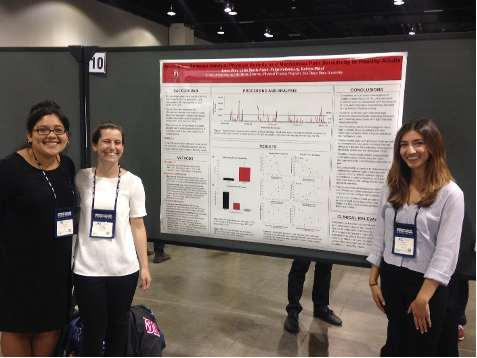
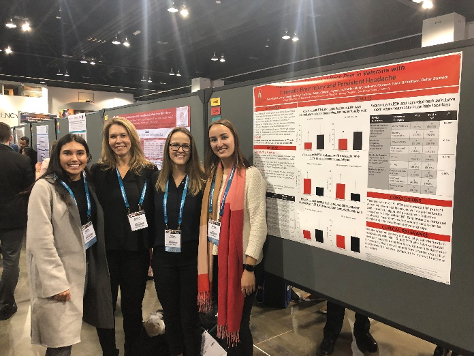
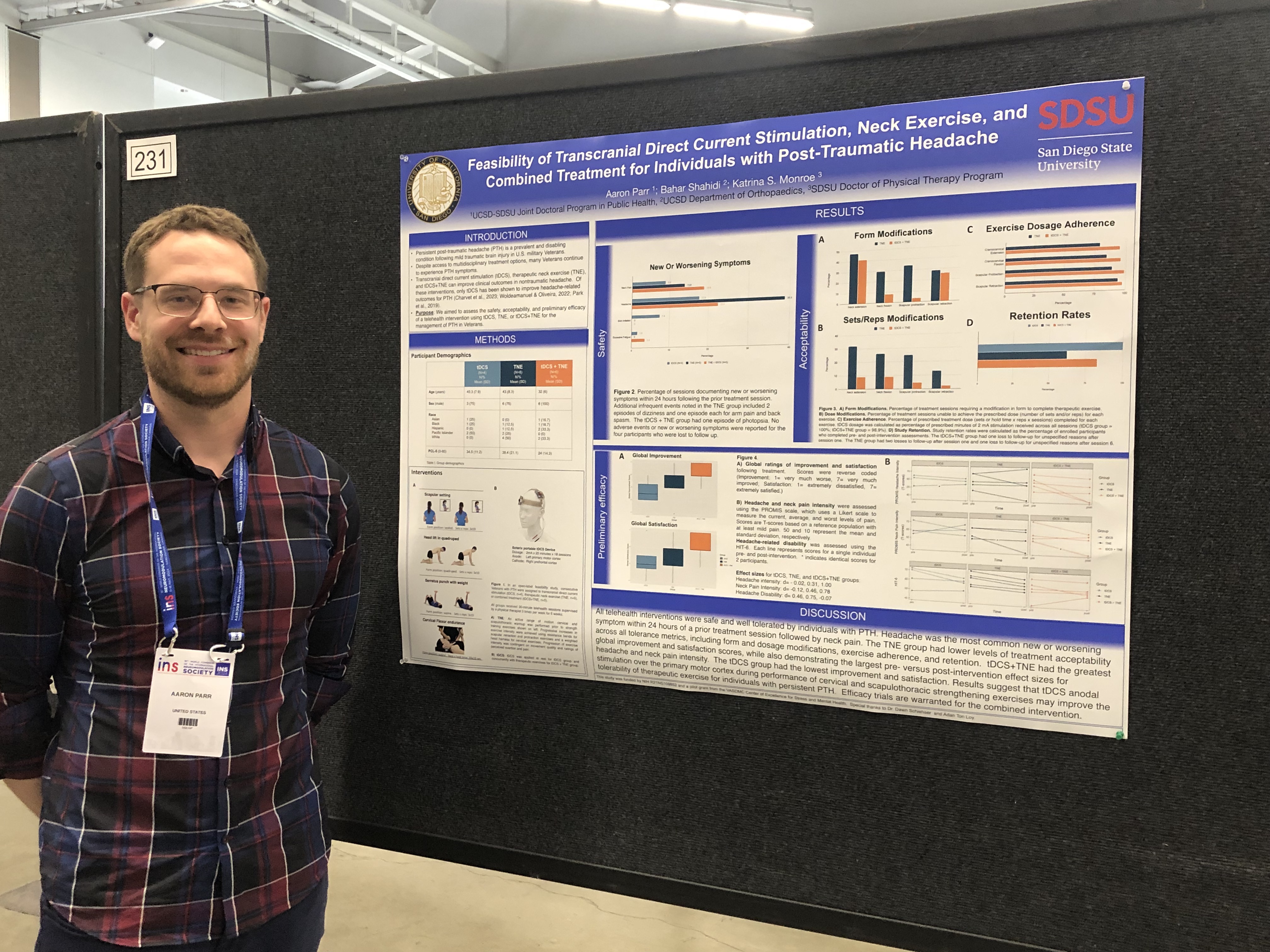
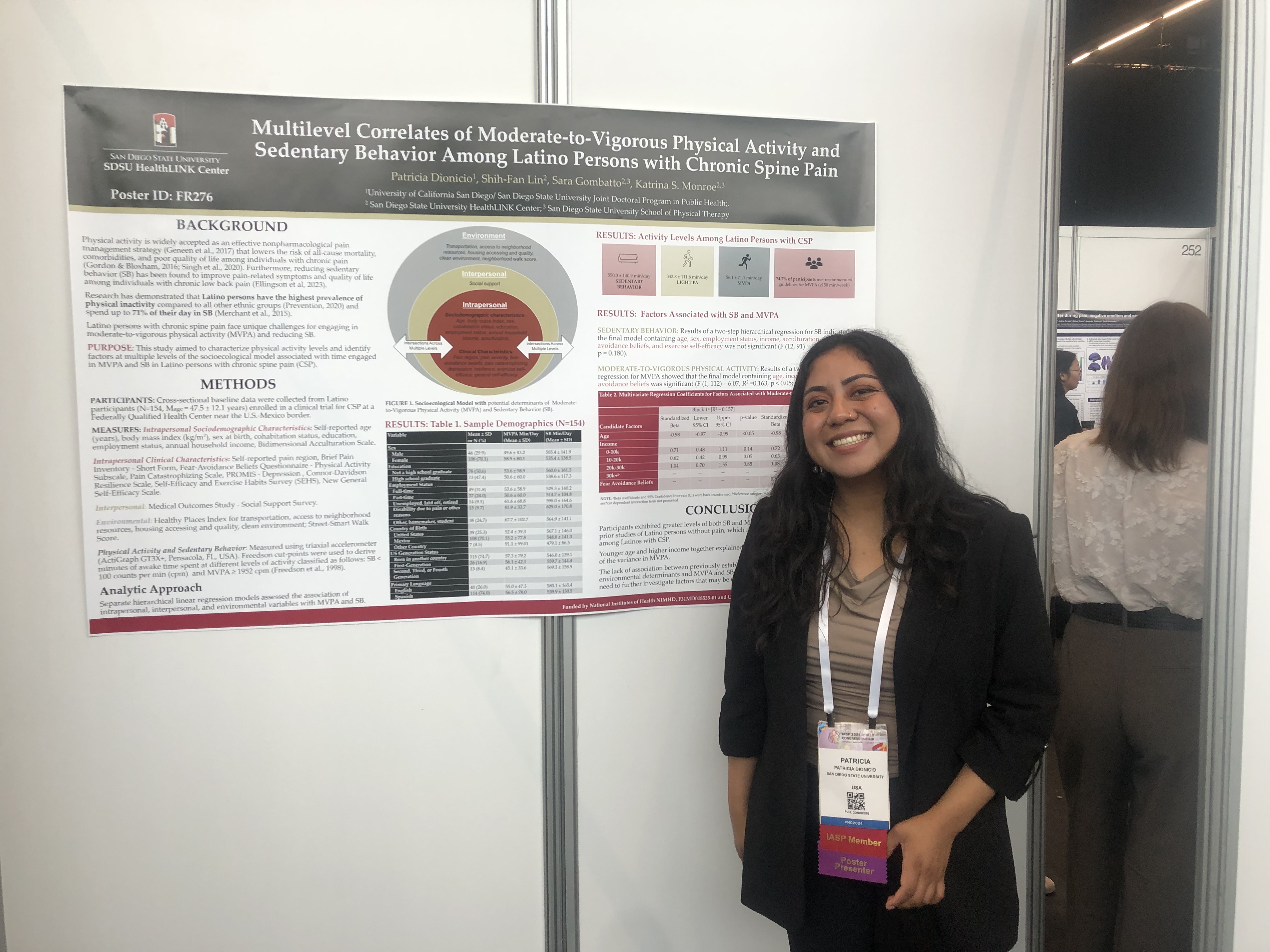
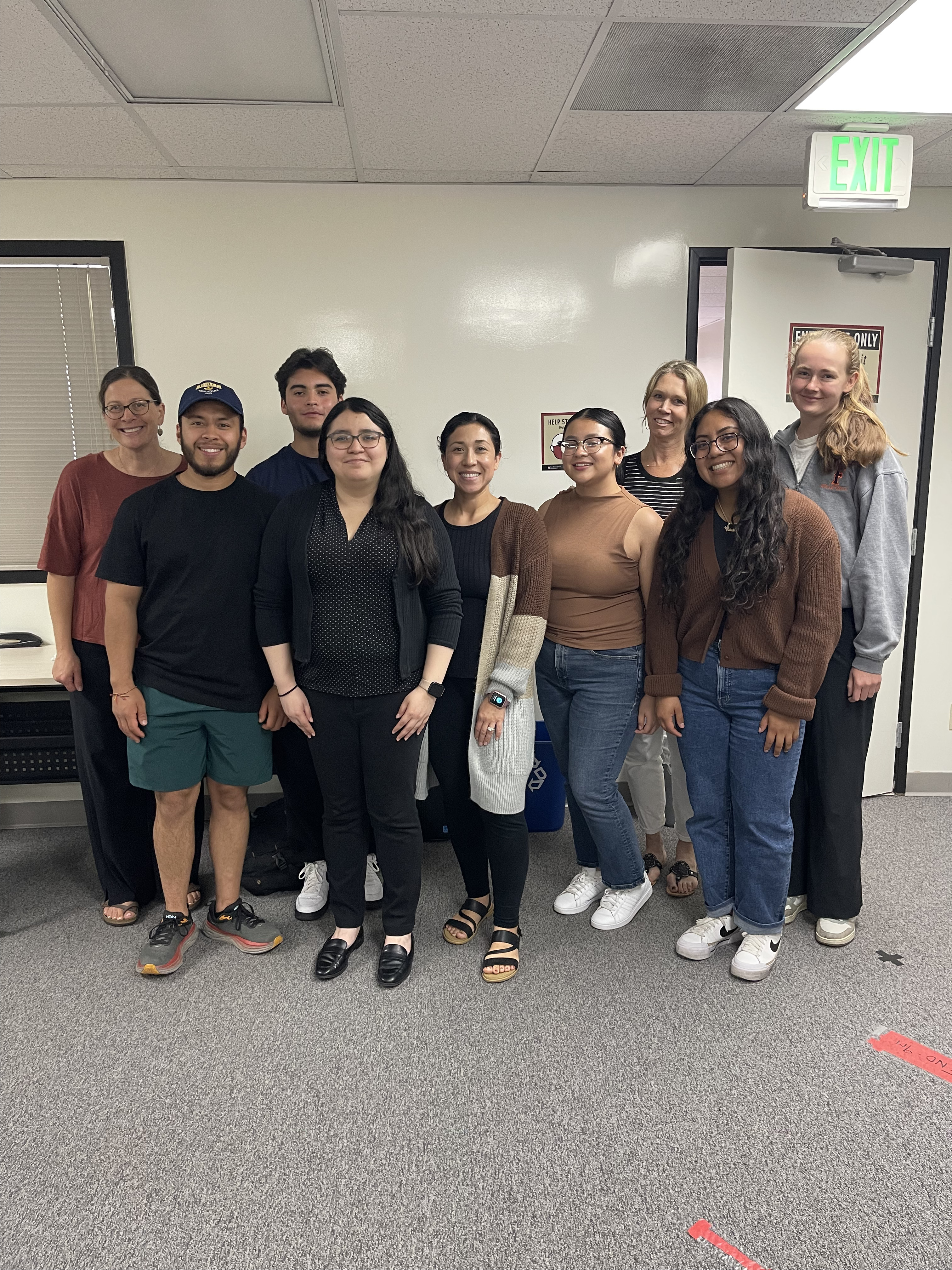
Contact Us
SDSU Physical Therapy
San Diego, CA, 92182-7251
